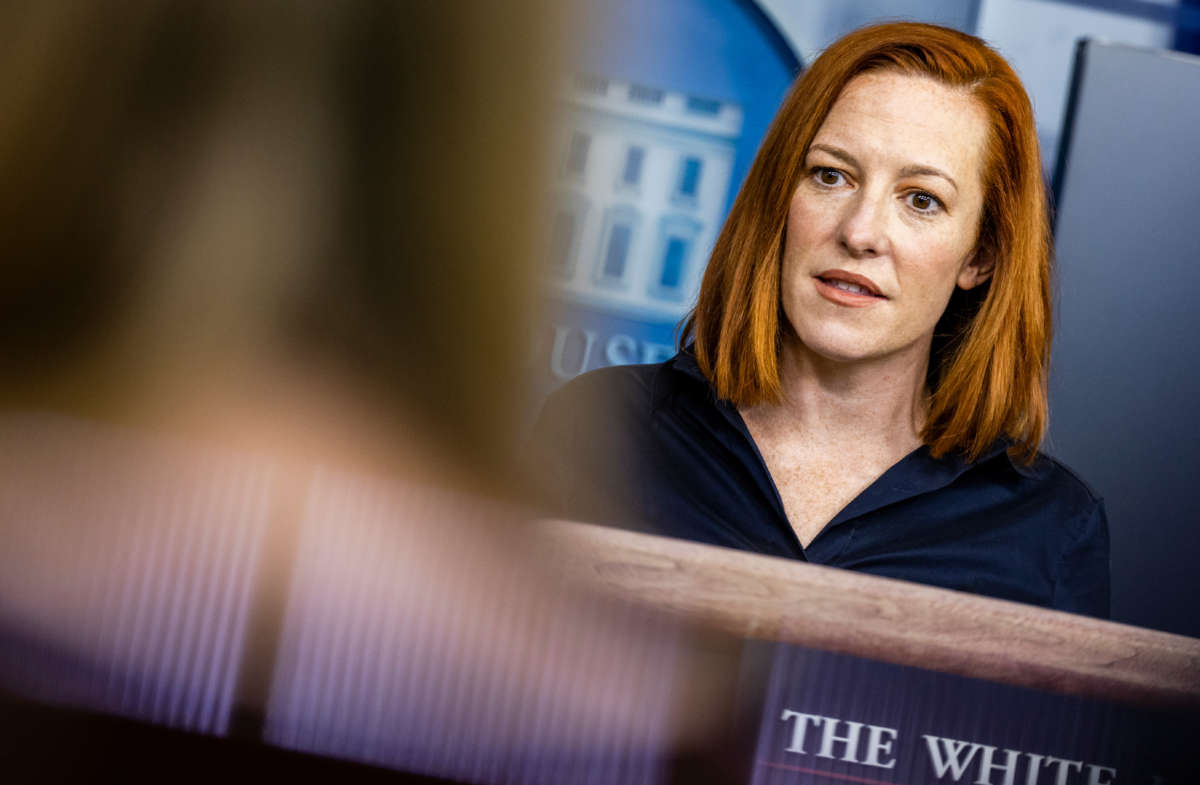Press Sec Psaki: Trump Doesn’t Deserve Vaccine Credit After 500K COVID Deaths


While fielding questions during the daily White House press briefing on Thursday, Press Secretary Jen Psaki was asked how much credit former President Donald Trump should get regarding the rollout of coronavirus vaccines across the United States.
“I don’t think anyone deserves credit when half a million people in the country have died from this pandemic,” the press secretary said.
ABC News senior White House correspondent Mary Bruce asked the question to Psaki on Thursday.
Current President Joe Biden “has been pretty critical of the prior administration’s handling of the pandemic, saying you inherited a mess here,” Bruce began, “but when it comes to vaccinations, you are following some of the same playbook here, so does the prior administration deserve some credit for laying the groundwork?”
Psaki questioned where that question came from. Bruce explained that it was suggested by Trump’s former coronavirus testing czar Brett Giroir, who had claimed Biden’s vaccine plan was 99 percent copied from Trump’s.
“He has said that the prior administration deserves more credit here for at least getting the ball rolling on some of these,” Bruce added.
Psaki rejected that argument outright.
“What our focus is on and what the president’s focus is on when he came into office just over a month ago, was ensuring we have enough vaccines. We are going to have them now,” Psaki added, stating that there were “not enough” vaccines available when Biden initially took office.
Psaki’s response is in line with previous criticisms from Biden, who has said in the past that Trump failed to procure enough doses of coronavirus vaccines before he left office.
The Biden administration purchased 200 million more doses of the Pfizer and Moderna vaccines in February, saying at the time that they had brought the vaccine totals high enough to vaccinate every person in the U.S.
“While scientists did their job in discovering vaccines in record time, my predecessor — I’ll be very blunt about it — did not do his job in getting ready for the massive challenge of vaccinating hundreds of millions,” Biden said in February.
In more recent days, the Biden administration also helped to broker a deal between two competing pharmaceutical companies, Johnson & Johnson and Merck, to produce millions more doses of a third vaccine in the coming months.
The increase in vaccine doses, Biden has said, will mean that every adult in the U.S. will be able to get vaccinated by the end of May.
Far from being helpful in putting a halt to the pandemic, Trump’s actions as president likely made matters worse. A study from the medical journal The Lancet noted Trump’s “appalling response” to the pandemic, which included making the wearing of masks a political issue. The manner in which the former president behaved regarding the virus “expedited the spread of Covid-19,” the report concluded. (The report also concluded that if the U.S. had the same health care system and approach to COVID-19 that other wealthy nations have employed, there could have been 40 percent fewer deaths from the virus than had actually occurred.)
A separate study, which examined 18 of Trump’s political campaign rallies held last year (which featured tightly packed crowds and very few in attendance wearing masks), found that the rallies were connected to at least 700 deaths and tens of thousands of coronavirus infections across the country.
By the time Trump had exited office, more than 400,000 Americans had died from COVID-19 — a stunning number that is worlds apart from what the former president had predicted just over one year ago.
While 118,000 more Americans have died due to coronavirus since Trump’s departure from office, it does appear that numbers are now trending in a better direction. On January 20, the last day Trump was in office, the seven-day average of new daily cases stood at 195,064 cases per day. As of March 3, that number has been reduced to 64,409 cases per day, a decrease of nearly 67 percent.
/cdn.vox-cdn.com/uploads/chorus_image/image/68917173/44376757260_27e2f299cf_k.0.jpg)







